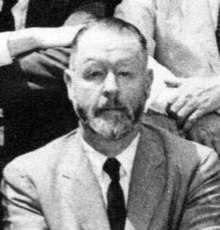Merrill Moore
| Merrill Moore | |
|---|---|

Merrill Moore in 1956
|
|
| Born |
September 11, 1903 Columbia, Tennessee, U.S. |
| Died | September 20, 1957 (aged 54) Boston, Massachusetts, U.S. |
| Education | Montgomery Bell Academy |
| Alma mater | Vanderbilt University |
| Occupation | M.D., psychiatrist, poet |
| Parent(s) |
John Trotwood Moore Mary Brown Daniel |
Merrill Moore (1903 – 1957) was an American psychiatrist and poet. Born and educated in Tennessee, he was a member of the Fugitives. He taught neurology at the Harvard Medical School and published research about alcoholism. He was the author of many collections of poetry.
Moore was born in 1903 in Columbia, Tennessee. His father, John Trotwood Moore, was a novelist and local historian who served as the State Librarian and Archivist from 1919 to 1929. His paternal grandfather was a lawyer from Marion, Alabama who served in the Confederate States Army during the American Civil War.
Moore was educated at Montgomery Bell Academy in Nashville, Tennessee, graduating in 1920. He attended Vanderbilt University, where he became a member of the Sigma Chi fraternity. He also joined the Fugitives, a group of then unknown poets who met to read and criticize each other's poems. He graduated with a bachelor's degree in 1924. He took an M.D. from the Vanderbilt University School of Medicine in 1928. He interned at the Saint Thomas Hospital in Nashville for a year.
Moore was a psychiatrist in the Ericksonian tradition. He taught neurology at the Harvard Medical School and the Boston City Hospital. He also conducted research on alcohol and addiction. In a 1937 article published in the New England Journal of Medicine, he argued that alcoholism had become rampant in the United States, and he called for the establishment of special wards for alcoholics in hospitals. Two years later, in the same journal, he argued that the heavier an individual, the less likely they were to feel drunk. By 1943, in the Boston number of the Medical Clinics of North America, he argued that adult neurosis and alcoholism could be prevented if parents ensured children matched the skills of their peers and never "go off the track of normal development". He also published articles in medical journals about "drug addiction, suicide, venereal disease [...], the psychoneurosis of war, migraine headaches." Meanwhile, Moore also treated patients like Robert Frost's daughter, who suffered from paranoia and depression.
...
Wikipedia
